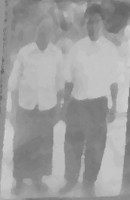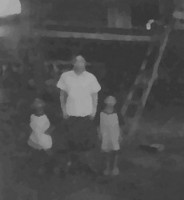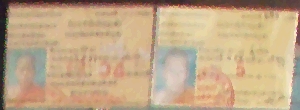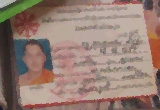Those left behind:



A new identity:


Concrete feels so different from rice straw:

Most of the teachers left home to ordain around the age of 13-15, in order to further their education beyond primary school. Some like Monk TYF & 3-day old monk stepped into school for the first time only at age 9-11. While Monk TYF's parents were supportive, packing him off to a larger village in a neighbouring province so that he could continue on to lower secondary school, 3-day old monk was under constant family pressure to drop out from the time he was 10 y/o, just like the cat's dad. Every pair of hands was needed in the fields, & one doesn't need to go to school in order to learn how to plant rice, maize or sesame. Cash for uniforms & books was (& still is) hard to come by. Even if their parents sold off part of their harvest or livestock, most of the earnings would be eaten up by the cost of travel to & from the nearest market, & the family would have less reserves of rice to see them through should the next harvest be poor. Back then, around the mid-90s, less than 20% of Lao children completed primary education, with another ~20% receiving no education at all.
Others like Novice Spoil Market & Monk Big Head (that's what his name means in Hokkien & Teochew :P) started their 5 years of primary education at age 7, then dropped out of the education system for 2-3 years. There was no secondary school within walking distance of their villages. Monk V had a bicycle, but once it had been worn beyond repair by Lao roads, making the 16KM roundtrip on foot was just too tiring.
In addition, quite a few of them finished Por. 5 (5th & final year of primary school) around the time the 1997 Asian Financial Crisis struck. Inflation hit 87% in 1998 & 134% in 1999. Some families found themselves no longer able to feed all mouths, & sons were sent to live in temples to lighten their parents' burden.
One father moved his family from the mountains (3 hours climb down to the nearest secondary school) to a lowland town in 1997 in order for his kids to have better access to education. Their attempt at starting a new life in town doomed by bad timing, the family retreated back to subsistence agriculture in the highlands. Nevertheless, they found an alternate path to their goal - sending two sons to become novices in a town temple. Quite a few families from traditionally animist ethnic groups have chosen this option, & there are now Khmu, Hmong & (more rarely) Akha novices. For those who had known only life within their isolated villages, had never stepped into a Buddhist temple before, & couldn't speak Lao, the experience was akin to being sent to Mars and being made to dress Martian (little orange instead of green men), speak, chant & write Martian & do other Martian stuff. For some, the journey to their new life was their first time seeing 'black' (paved) roads.
Some had no advance warning e.g. One day somebody from my village took me to go with him & when we arrived XXX town he took me to be novice, or a parent handing them just enough cash for the boat journey to XXX town & telling them to leave & find a temple there. Others saw it coming - it was a matter of time before they finished primary school & were sent to join an older brother or cousin, or it was the usual thing that happened to many boys when their parents died or divorced & relatives couldn't take them in.
In short, practically all of the teachers ended up in temples by circumstance rather than by choice, & the town temples together with the monastic schools end up serving as a boarding school system for rural boys (not unlike Thailand). The merit that they make for their parents by ordaining is just a bonus. As each successive cohort of monk & novice students graduate from the monastic high schools & waste no time returning to lay life & dreams of jeans & motorbikes, they are quickly replaced by a new crop of boys from the villages.
KHIT THEUNGGG!! ex-novice Reebok cap roared in response to the question khit theung baan bor (miss home or not?), hence the title of this post. 出家 chu1 jia1 (lit. exit home) & 想家 xiang3 jia1 (lit. think home) are the Chinese terms for becoming a monk & for missing home respectively.
With the rising prosperity of the more fortunate in the towns & the concomitant increase in the amounts they give as alms, more of the teachers are able to save enough to travel home to visit their families. In the past, quite a few wouldn't see them again for as long as 5-8 years after leaving, now many are able to make the trip home every 1-2 years.
Some like 3-day old monk have no phor mae (parents) left to khit theung (miss), but still look forward to such visits to see their siblings & other relatives, catch up with childhood friends, & enjoy a brief respite from urban life. But there are some who don't care much for home, like one particularly bitter novice who never wants to see his mother or stepfather again - somehow it seems rather common for kids from previous marriages to be 'cast off' when divorced parents remarry (another similarity between Lao & Thai society?). When parents walk out, some sons take a direct route to the temples, others take an indirect route (left to grandparents, & then end up in temples when the grandparents eventually pass away), & the cat would later meet one boy taken in by an expat falang.
Unlike the owners of the first three photos, quite a few who move from the sonnabot (countryside) to live/study/work in urban areas have no photos of their families, & likewise their families have no photos of the kids whom they will hardly get to see for years. When giving its teachers photos of themselves, the cat passes them two copies so that they can send one to their parents back home. Wonder if any of the monk-stalking photographers juggling assorted lenses, tripods, memory cards & other accessories while staking out the monk-shooting hotspots of Luang Prabang might be interested in doing the same? Or are their photos meant only for professional portfolios, Lightstalkers/TrekEarth/Zenfolio/Pbase/Picasa/Flickr, & commercial purposes?

No comments:
Post a Comment